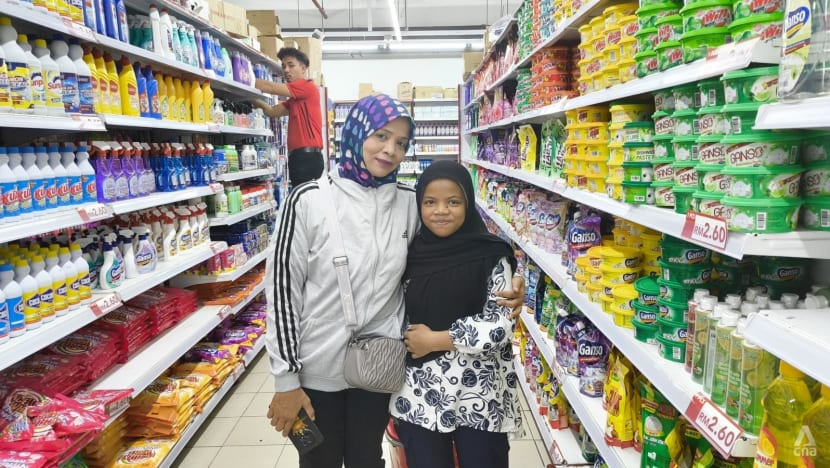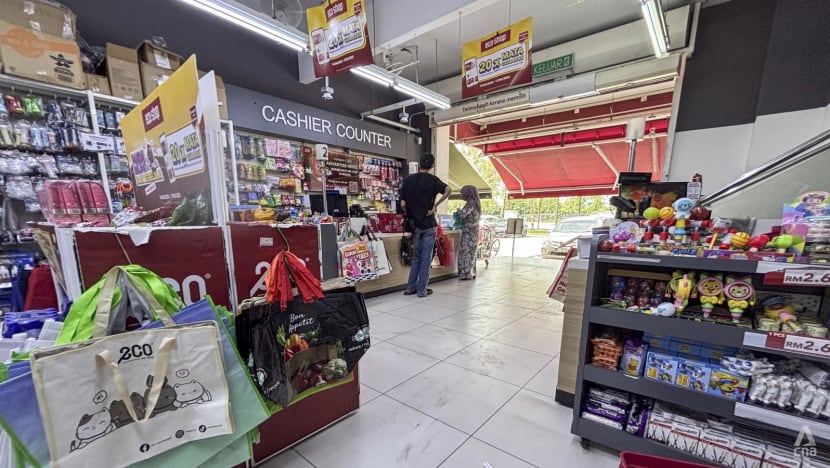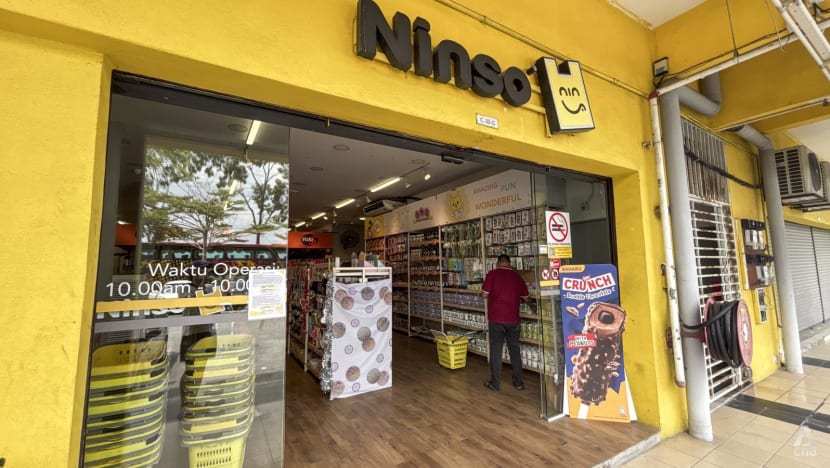Everything under US$1: How Malaysia’s ‘recession-proof’ value stores soar to be worth billions
One such chain, Eco-Shop, last week became Malaysia’s biggest initial public offering so far this year, with a valuation of RM6.67 billion (US$1.57 billion) after its listing.

An Eco-Shop outlet in Shah Alam, Selangor. The company's initial public offering took place on May 23, 2025. (Photo: CNA/Fadza Ishak)

This audio is generated by an AI tool.
KUALA LUMPUR: In the leaner days leading up to her payday each month, supermarket cashier Azura Hanib turns to her local Eco-Shop in Selayang, Selangor, for everyday items such as dishwashing liquid.
At the budget-friendly chain store, most items, from biscuits to baby wipes, retail for RM2.60 (US$0.61), allowing Azura to stretch her dollar.
“Being able to buy things in small quantities – dish wash, a few exercise books – makes some difference," Azura, 44, told CNA while shopping with her 13-year-old daughter.
"With how difficult life is, you really have to be mindful of every single cent," added the mother of four children aged 10 to 20.
Since 2003 when it was started by businessman Lee Kar Whatt, his brother and two other people, Eco-Shop has expanded to over 350 stores across the country by catering to budget-conscious consumers.
It became Malaysia’s biggest initial public offering (IPO) so far this year on May 23, listing on the Main Market of Bursa Malaysia. It ended its first day of trading at RM1.20, above the IPO price of 1.13 per share, making its founder Lee a billionaire.
The successful IPO highlighted the strength and potential of a business model offering consumers affordability amid economic uncertainty, analysts said.
"Because everybody wants to save money, dollar stores are generally seen as recession-proof. That's where people go, especially those in the low-income (B40) and some in the middle-income (M40) bracket," said Vincent Lau, equities broker Rakuten Trade’s head of equity sales.
CNA takes a closer look at the rise of value chain stores in Malaysia and elsewhere, as well as what could curb their growth.
RISE OF DOLLAR STORES IN MALAYSIA
Starting with one RM2 store in the town of Gemas in Negeri Sembilan, Eco-Shop has grown to become Malaysia's leading dollar store chain and currently has 358 outlets across the country.
In its prospectus, it said it plans to add an average of 70 new stores annually for the next five years.
The company is worth about RM6.67 billion after its listing.
The vast majority of its more than 10,000 items each cost RM2.60 in Peninsular Malaysia and RM2.80 in East Malaysia.
Eco-Shop has also launched 22 Eco-Plus format stores featuring a wider range of products at various prices.
Its net profit has risen from RM27.09 million in 2022, to RM105.07 million in 2023 and RM177.28 million last year.
While Eco-Shop is the biggest dollar store player in Malaysia and commands almost 70 per cent market share, there are several other players such as Ninso and Eko Jimat.
Ninso originated in Kluang, Johor in 2017, and now has 99 outlets across the country.
Eko Jimat has 72 stores, while Japanese chain Daiso, whose items are mostly RM5.90 each, has 70 stores. NT Shop has 36 stores, while Setia has 34 stores.
Predominantly located on individual shoplots, some of these stores have also set up in malls.
According to a market research report by consulting firm Frost & Sullivan for Eco-Shop’s IPO, the dollar store-based retail segment in Malaysia has experienced significant sales growth from around RM1 billion in 2016 to RM4 billion in 2024.
While their popularity may not be surprising to some, others have found it remarkable.
"I'm actually quite surprised at how big the dollar store trend has gotten,” said Mydin Hypermarket founder and managing director Ameer Ali Mydin, who has 70 branches in Malaysia.
With the ringgit weakening over the years and one American dollar now equivalent to RM4.25, “you kind of think, 'What can you really buy for RM2.60?”, Ameer said.
“But they seem to have enough things to keep people coming back," he said, adding that he does not intend to enter the fray as he did not want to spread his business thinly.
A walk through the Eco-Shop and Ninso branches in Selayang reveals no shortage of items ranging from the practical to the whimsical at the RM2.60 price point.
Besides plastic containers, file covers, a pack of 80 baby wipes, 500ml hand wash, shampoo, flower pots and tools such as spanners and sets of allen-keys, there are also toys and capybara-themed hairbands.
The shops also sell food items such as biscuits, chocolates and snacks.

Frost & Sullivan's report indicated further growth potential, noting that as of last year, the sector in Malaysia had a penetration rate of 23 stores per million population.
The rate is low compared to more mature markets such as Japan, which has 87 stores per million population, the United States with 119 stores per million population, and Canada with 127 stores per million population.
The report estimated that the penetration rate of dollar stores within Malaysia is 1.5 per cent of the sales value of the store-based retail sector.
Sales in Malaysia's dollar store industry are projected to reach RM7.8 billion by the end of 2029, it stated, up 95 per cent from 2024’s RM4 billion.
“These stores have proven to be recession-proof, offering affordable options during economic downturns and high inflation rates,” Frost & Sullivan wrote.
“By providing a range of homogeneous goods at fixed prices, dollar stores attract new customers who would typically shop at higher-priced retailers, especially during times of economic uncertainty,” it said.

The concept also exists in other Southeast Asian nations like Singapore, with stores such as Valu$, and Thailand where there are 20-baht shops.
In Japan, meanwhile, 100-yen shops have become a fixture in the retail landscape.
Eco-Shop’s chief executive Jessica Ng told CNA that the fixed-price retail model has gained global traction, particularly during periods of economic uncertainty.
“In Malaysia, we have seen growing demand for value-retailing, driven by rising cost-of-living concerns and increasing consumer awareness of smart spending,” she said via email.
“Notably, value retail has become more mainstream, attracting not just lower-income shoppers but also middle-income households looking for everyday essentials at affordable prices,” she said.
Eco-Shop’s business model tends to be countercyclical – during inflationary periods or economic slowdowns, consumers become more price-sensitive, which tends to drive more traffic to fixed-price retailers, she added.
Malaysia's headline inflation was 1.8 per cent in 2024, lower than the 2.5 per cent in 2023. This year, headline inflation is expected to be between 2 and 3.5 per cent.

HOW ARE DOLLAR STORES ABLE TO SELL SO CHEAP?
What is the secret behind these dollar stores' ability to sell products relatively cheaply?
Economist Yeah Kim Leng, while surprised at the variety of items on sale for less than the price of a coffee, attributed it to the bulk purchasing ability of dollar stores.
Ng of Eco-Shop said its business model is built on high volume and scale – products are bought in bulk, so the company is able to sell them cheaply.
The fixed-price model boils down to scale, efficiency and strategic sourcing, she said.
“Our sourcing strategy is very deliberate. We’ve built strong, long-term relationships with suppliers from Malaysia and different parts of the world,” she said.
“Over the years, we’ve also established direct factory relationships, which helps us get better pricing and avoid middleman costs.”
Dollar stores are not immune to price pressures and other challenges, however. Just last month, Eco-Shop and Ninso hiked their prices from RM2.40 to RM2.60.
According to analyst reports, such stores are also labour-intensive and dependent on both foreign labour and suppliers.
Ng said key challenges range from managing rising costs from supply chain disruptions and foreign exchange fluctuations, to higher freight and logistics expenses.
Its draw lies not only in affordability, but also variety, Ng added. Which is why each Eco-Shop outlet offers 5,000 to 11,000 items.
“Whether it’s homeware, personal care, snacks, or stationery, we make it a point to keep our product assortment fresh and relevant so that every trip to the store feels like there’s something new to discover,” she said.

While Yeah noted there is competition from other brick-and-mortar stores as well as the global online marketplace – Chinese e-commerce giant Taobao launched a Malay-language interface that automates translation across the platform this week, for instance – dollar stores enable customers to “have a feel” of the items on offer.
“That is why these stores can do well,” he said.
And while customers appreciate the affordability and range of items at value stores, some are mindful of impulse purchases while others say they would visit other shops and pay more for certain items.
Mary Agnes, 50, from Batu Caves, told CNA nearly half of her purchases from monthly visits to Eco-Shop are unintended – a behaviour Frost & Sullivan’s report terms “treasure hunting”.
“The perception of getting a good deal can drive impulse buys, even for things people might not need,” Mary acknowledged.
Mechanic Hazri Mukeri, 45, who is from Selayang, said that while stores such as Ninso and Eco-Shop are useful for small items such as plastic containers, he would be pickier when it comes to tools needed for work.
“Of course, you can purchase some things such as cable ties (here) but when it comes to tools such as spanners, the items sold would not last as long as those pricier products found in proper hardware stores, for example,” he said.



















